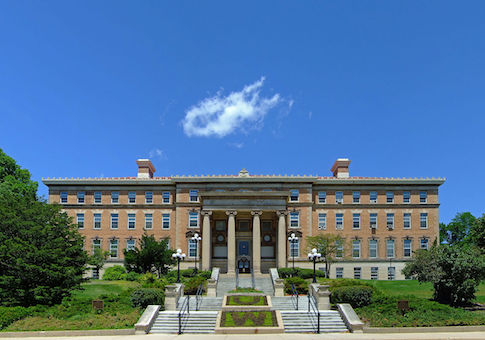The student government at Wisconsin's most prominent university has passed legislation calling for "free and full access" to the school for "all black people" as reparations for what it describes as "systemic denial" of minorities from the "white supremacist" institution.
The resolution passed at University of Wisconsin-Madison was introduced by a group called "The Blackout Project," which argues that the "school is not inclusive, accessible, or affordable for Black students in Wisconsin" and that it knowingly benefits from "practices of exclusion and white supremacy."
Among the demands in the resolution is "full and free access for all black people," including "currently and formerly incarcerated people."
"Making reparations for the systemic denial of high-quality education in the form of free and opportunities in the form of free and full access for all Black People—including undocumented and current or formerly incarcerated people—to UW-Madison," it demands.
It also demands the creation of a task force to consider "test-optional admissions and geographically weighted admissions" that would give preference to students in cities.
'Cognitive Dissonance Legislation' passed at UW-Madison by Washington Free Beacon on Scribd
The goal of the resolution, according to an op-ed written by a student government member who authored the legislation, is to force the administration to attach real action to its use of phrases such as "inclusion" and "diversity."
"As students, we understand that despite the University's rhetoric, this school is not inclusive, accessible, or affordable for Black students in Wisconsin," wrote Tyriek Mack, who sponsored the resolution. "The University is not blind to this reality; in fact, the University’s brand and prestige benefits from their practices of exclusion and white supremacy."
Mack defended the call for free and full tuition to the university for all black people—a demand taken directly from the Movement for Black Lives policy platform—because he claimed the university perpetuates "white supremacy."
"I always find it comical that the University of Wisconsin-Madison attempts to position itself as the torch holder which will light the cauldron of justice," Mack wrote. "Personally, I don't find their arguments appeasing because at the end of the day, whether the University decides to make a statement or not, they still perpetuate white supremacy."
Mack said that the university, like the United States as a whole, spreads propaganda when it uses phrases like "diversity."
"If this University, or America as a whole, is good for anything, it’s spreading propaganda," he wrote. "Empty phrases like 'inclusion' and 'diversity' are just the contemporary nomenclature for 'token integration.'"
Associated Students of Madison Resolution on Diversity by Washington Free Beacon on Scribd
"Ultimately, the inclusive rhetoric propagated by these white supremacist institutions have little real meaning," he wrote.
Mack said the United States never deserved to be called the leader of the free world, a title that has been used since the Cold War with the Soviet Union.
"It's being said that since Trump was elected, China is priming to be the leader of the 'Free World,'" Mack wrote. "As ironic as that sounds, it's ludicrous that America was ever considered the leader of the 'Free World.'"
Asked by the Washington Free Beacon if the resolution would apply only to black people in Wisconsin and how offering university access to incarcerated people would work, Mack said that answers to these questions do not yet exist.
"Those are questions that will be answered in negotiations with administration and in future legislation," Mack said in an email.
A university spokesman told the Badger Herald that the student resolution is likely illegal.
"It’s unclear that the methods that they’re suggesting are either legal or the best approach to accomplishing those goals," said spokesman Meredith McGlone.
She pointed out that considering applicants without a standardized test score would violate state policy. She also pointed out that the school has increased the proportion of "students of color from 11 to 15 percent over the past decade."
